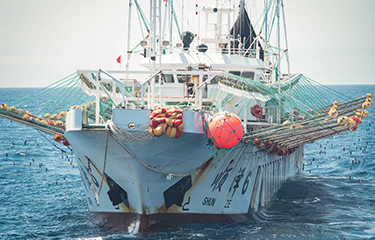Oceana, a Washington, D.C., U.S.A.-based environmental nonprofit, has described China’s self-imposed bans on its squid fleet as a PR stunt that does nothing to address overfishing, with analysis from the NGO finding that these annual bans avoid areas where Chinese vessels actually fish.
In 2022, China introduced a voluntary ban on squid fishing lasting from 1 July to 30 September in the high seas of the North Indian Ocean outside the jurisdiction of the South Indian Ocean Fisheries Agreement, of which China is a participatory nation. This added to two other voluntary bans the country announced in 2020. One, lasting from 1 July to 30 September each year, covers parts of the Southwest Atlantic Ocean stretching from 32 degrees to 44 degrees south and 48 degrees to 60 degrees west, and the other is a voluntary moratorium running from 1 September to 30 November in the Eastern Pacific Ocean stretching from 5 degrees north to 5 degrees south and 95 to 110 degrees west.
Using satellite data, Oceana has determined that China’s fleet has spent little to no time in recent years in the areas over which it has imposed moratoriums.
“China’s supposed fishing bans are built on false pretenses. It’s like a penguin saying it’s giving up flying,” Oceana Campaign Director Max Valentine said. “Ending squid fishing in areas where there is no fishing does nothing to protect squid … We need real solutions – not ones built on optics to disingenuously win the world’s good favor.”
Oceana analyzed the activities of Chinese-flagged squid-fishing vessels using automatic identification system data obtained from Global Fishing Watch an independent nonprofit founded by Oceana in partnership with SkyTruth and Google. AIS devices transmit information such as a vessel’s name, flag state, and location.
Describing China as “one of the world’s worst actors when it comes to illegal, unreported, and unregulated [IUU] fishing,” Valentine said the country’s “PR stunts” emphasize that “increased transparency of fishing is needed to stop these types of bait and switches.”
According to Oceana, China spent more than 330,000 hours squid fishing in the first half of 2023. Harmful government subsidies that promote overcapacity and incentivize overfishing are directly responsible for propping up China’s distant-water fleet, Oceana said.
The self-imposed bans have also drawn skepticism from fishery watchdogs elsewhere.
“I personally believe that all [of] China’s announcements about bans and conservation or real cooperation are nothing more than publicity stunts,” said Eduardo Pucci, the director of the Organization for the Protection of Resources in the Southwest Atlantic (OPRAS).
Pucci, who has previously criticized Chinese fishing effort off the coast of South America, said he’s worried about overfishing in the region his organization oversees. He said China’s self-imposed moratorium was a “meaningless gesture timed to coincide with the habitual end of the squid season when stocks have been fished.”
Atlantic species like squid have faced exorbitant pressure from overfishing, according to Pucci, with 90 percent of the 500 fishing vessels seeking Southwest Atlantic squid stocks in 2023 being of Chinese origin.
“The effects of that irresponsible fishing are already being felt in the region’s EEZs [exclusive economic zones], including Brazil,” Pucci told SeafoodSource
Globally, squid fishing increased by 68 percent between 2017 and 2020, according to a research paper published by Science Advances, which also calculated that 86 percent of the fishing activity occurred in areas that featured little to no regulatory oversight.
To rectify this issue, Pucci has called for binding high seas fishing regulations, but he said he’s wary China’s economic clout will prevent the taking of serious action against rogue Chinese vessels.
“There is no social awareness about this problem among politicians who negotiate other economic issues with China,” Pucci said. “The weakness of the coastal states and their apparent disregard for the resources of the sea make this scenario continue, and surely, it will end in a disaster for the fishing industry of the coastal countries and, of course, for the marine ecosystem.”
These criticisms starkly differ from how China has presented the bans’ objectives. A report on China’s national TV station on 1 July featured ...
Photo courtesy of Sea Shepherd Conservation Society








